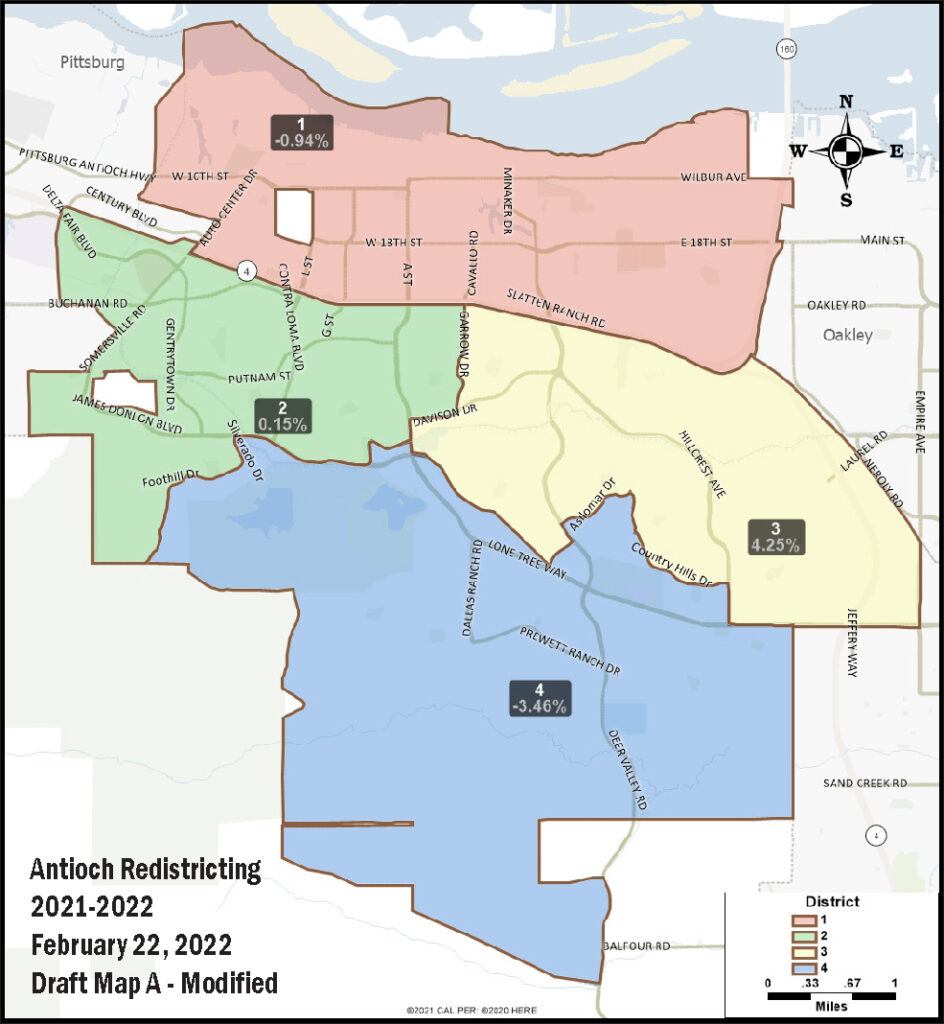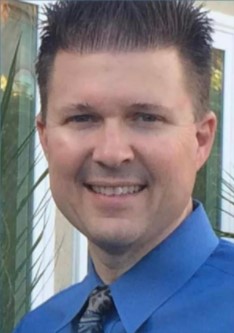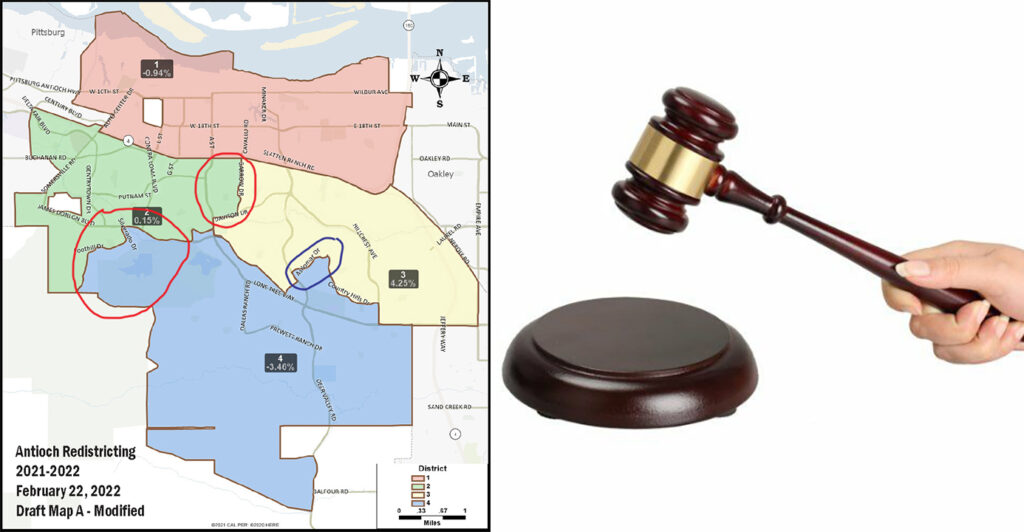
The Antioch City Council on a 3-2 vote adopted Draft Map A – Modified as their final choice during a special meeting on Friday, March 11, 2022. Source: City of Antioch and Q2.
Moves Ogorchock into District 4 who announces run against Wilson in November
Torres-Walker chastises public speakers claiming using term “ignorance” and calling council “circus” is racist against Black members and is referring to them as “monkeys”
Thorpe gavels down Ogorchock at end of meeting, preventing her from speaking and calling for evaluation of interim city manager
By Allen D. Payton
During a contentious, special meeting of the Antioch City Council late Friday afternoon, on another 3-2 split vote the final redistricting map was approved, again. This time the council majority approved Draft Map A – Modified, which was politically drawn with direct input from both Mayor Lamar Thorpe and District 1 Councilwoman Tamisha Torres-Walker and is more gerrymandered than Draft Map A, which the three approved on Tuesday night – believing they had approved the modified map. The final map moves District 3 Councilwoman Lori Ogorchock into District 4, which is currently represented by Councilwoman Monica Wilson. Ogorchock threatened to run against Wilson whose seat is up for re-election in November. (See meeting video and related articles here and here)
All seven members of the public who spoke during the meeting, which began at 5:15 p.m., were in favor of either Map 91, previously rejected by a majority of council members, and Map 521, both drawn by members of the public, because they said those maps comply with the requirements in the FAIR MAPS Act, while Draft Map A – Modified does not. That’s because the final map divides three neighborhoods in violation of the act, including Mira Vista Hills, split between Districts 2 and 4, and the neighborhood between Lone Tree Way and Hillcrest Avenue south of Highway 4 and north of `Davison Drive which uses Garrow Drive as the boundary line between Districts 2 and 3, as Thorpe directed the consultants of Q2 to draw during the Feb. 22 council meeting. In addition, the neighborhood near Country Hills Drive, just east of Deer Valley Road, is divided using Asilomar and Montara Drives, as the consultants were directed to draw by Torres-Walker during that same meeting.
During Council Discussion Ogorchock Questions Torres-Walker, Announces Run for Election in District 4 in November
After Thorpe directed the consultants to make more modifications to Draft Map A – Modified, Mayor Pro Tem Mike Barbanica made a motion to adopt Map 521. That only gained Ogorchock’s support, and it failed on a 2-3 vote.
Torres-Walker then made a motion to adopt Draft Map A – Modified and Wilson seconded it.
During council discussion, Ogorchock said, “lines are just being moved to accommodate percentages, that’s it. We’re not looking at communities of interest. We’re not looking at any of the items in the FAIR MAPS Act.”
She pointed out that three maps created by members of the public, 91, 516 and 521 comply with the act.
“You are the public, we should be listening to you,” Ogorchock said to the audience.
“Is there a reason you went up Montara and you had a hard time saying Montara? Why did you go up Montara and Asilomar down to Deer Valley off of Country Hills? Why?” she asked Torres-Walker, referring to her making changes to Draft Map A the Feb. 22 meeting, in which Torres-Walker asked the consultants about Montara Drive and specifically had the consultant move the boundary line between Districts 3 and 4 further north to Asilomar Drive from Country Hills Drive as it was in Draft Map A which includes the street where Ogorchock lives.
Torres-Walker replied simply, “I just moved the lines.”
Ogorchock shot back, “why? Did you know I lived there?” to which Thorpe hit the gavel interrupting Ogorchock.
Torres-Walker replied, “I have no idea where you live.”
Ogorchock continued by saying, “residents have participated and are being ignored. Residents created the maps. They know our communities. They know where the lines should be drawn. They do. We should be listening to them.”
She then read from the requirements in state law and pointing out how Draft Map A – Modified violates the requirements to create “a district in which one may travel from any one location to another without crossing a district boundary…Asilomar, Montara, Silverado. There’s a bunch. We’re not following that one.”
“Criterion 7,” Ogorchock continued. “The council shall not adopt council district boundaries for the purpose of favoring or discriminating against a political party. Communities of interest may not include relationships with political parties, incumbents or political candidates. We’re failing on this one. Favoring and discriminating is happening on this map.”
“Criterion 6, assume to guard against all types of gerrymandering,” she stated. “This is what’s happening. We’re failing on that one. We’re gerrymandering. I’m not.”
“Criterion 5, lines need to make geographical sense,” Ogorchock pointed out. “Those lines on that map make no sense whatsoever. They’re not easy to follow. You don’t know where the streets are. If a resident drives down the street they should know I’m in District 4, I’m in District 3, I’m in District 1, I’m in District 2. They can’t tell. District lines should be straight forward.”
“When people came forward, they talked about communities of interest,” she shared. “We’ve ignored them. We’ve ignored everything.”
“If you look at Garrow Drive…same neighborhood, same socio-economic individuals in that neighborhood. You’re dividing them,” Ogorchock continued. “Silverado, Foothills. They’re from 1970’s. You have, still original homeowners up there. You’re dividing them.”
“Country Hills,” the District 3 councilwoman continued. “You’re dividing Ponderosa at Jack London (Elementary) School. I live there. You have created a map to go up Montara, specifically said Montara, to go up Montara to Asilomar to Deer Valley to put me in District 4. If that happens, I’m announcing, tonight I will be running for District 4.”
“You are breaking everything in this packet, and you are opening us up for a lawsuit,” Ogorchock concluded
Torres-Walker Chastises Public, Claims Using Terms “Ignorance” and “Circus” Against Black Officials is Racist
During public comments members of the audience criticized the council with one, Sandy Hartrick saying, “the city council should not be drawing maps. It brings into question the gerrymandering or just plain ignorance of the city council.” Another speaker, Karen Abfalter, said, “this meeting should not be happening at this hour at 5:15…this has literally become a three-ring circus. Shame on you,” to applause from the audience. That didn’t sit well with Torres-Walker who, during council discussion on the motion to adopt the final map, chastised the residents in the audience, making the claim that using the terms “ignorance” and “circus” about elected officials who are Black is racist, the latter term because it’s referring to them as monkeys. (See video)
“What I do want to say is what I have heard is references to ignorance or being ignorant and I’m just going to have to assume that this reference around ignorance is being pushed towards those on the council who just so happen to be Black,” Torres-Walker said.
Those in the audience reacted by saying “oh” and “no” and with laughter which resulted in Thorpe pounding his gavel multiple times, attempting to stop the councilwoman from continuing her rant, but she continued talking over the mayor.
“I also want to say, that what I also heard, what I also heard to myself that was absolutely ignorant was a reference to a circus,” stated Torres-Walker while raising her voice over Thorpe’s gaveling and saying, “Councilmember Torres-Walker, hold on, let me finish. Councilmember Torres-Walker.”
“And when you are talking to people of color and Black people in particular you do not reference a circus because we are not monkeys and we are not clowns,” she said as Thorpe continued to pound his gavel and call her name to get her to stop talking, which she did, briefly.
But Torres-Walker then said, “you can say I’m a monkey all you want but that just references your ignorance” as Thorpe again pounded his gavel, calling her name and saying, “excuse me”. She finally stopped speaking.
Thorpe then told the audience to not interrupt when people are speaking and offered apologies to Torres-Walker.
“I’m just tired of the racial references and the constant attacks on my leadership and the leadership of people of color on this council,” Torres-Walker then said in a calmer voice and went on to speak about the process.
Wilson, who was not present but attended the meeting online, thanked Torres-Walker for her comments.
Thorpe Gavels Down Ogorchock, Prevents Her from Speaking After Vote
He tried to limit Ogorchock to just three minutes saying what was on the agenda was public comments and that she could have three minutes just like any member of the public. Ogorchock refused the time limit and while trying to speak, calling for an evaluation of Interim City Manager Con Johnson, Thorpe gaveled her down and telling her, “you are out of order”.
“You can beat the crap out of it. I don’t care,” Ogorchock said to Thorpe. She then appealed to City Attorney Thomas Lloyd Smith asking, “are you going to say something? I’m part of this council and I can say what I want and I don’t have a time.”
“Let me make this clear,” Thorpe then stated. “The agenda says ‘public comments’. If you want to make public comments, that’s fine. You get three minutes like…the rest of the public. Any member of the public may comment only on unagendized items. So, you can say whatever you want for three minutes.”
“I’m a councilmember. So, therefore I’m afforded more time,” Ogorchock responded.
“I’m trying.” she tried to continue while raising her forefinger, but Thorpe cut her off saying, “excuse me. Don’t point your finger at me. Keep it down, relax.”
“I just did. I did. It goes up. No,” Ogorchock shot back. “My comments are to…”
Thorpe interrupted her, again saying, “motion to adjourn.”
“The interim city manager to have an evaluation,” she finished saying.
“Motion to adjourn,” the mayor repeated.
“Can we allot the Councilwoman Ogorchock hree minutes as a…?” Smith asked. But Thorpe interrupted him.
Torres-Walker then said, “motion to adjourn” as Thorpe said, “I did give her three minutes. She didn’t want it.”
“Motion to adjourn,” Torres-Walker repeated. “Is there a second?” Thorpe asked, to which Wilson offered a second.
It passed on a 3-2 vote with Ogorchock and Barbanica voting no. Thorpe then hit the gavel to end the meeting. (See video on the Antioch Herald Facebook page or on the complete video of the meeting on the city’s website)
Barbanica Calls Final Redistricting Map Disservice to Community
“What you just witnessed was a disservice to this community,” said Mayor Pro Tem Mike Barbanica following the meeting. “A majority of the council voted on a 3-2 to divide three long-standing neighborhoods in our community.”
Public Speakers Respond to Torres-Walker Deny Racial Intent in Using Terms “Ignorance” and “Circus”
When asked about her use of the term “ignorance” and if she meant something racial by it, Hartrick said, “not at all. I’m just appalled that she’s taking regular English language and twisting it for her purpose. I felt bad that she got so upset by words that had no intention of implying any racial connotation.”
When asked if she meant anything racial by using the phrase “three-ring circus”, Abfalter said, “Seriously? It’s an idiom. I had to laugh. I showed my husband a video of the meeting. He said, ‘you’re right. It’s a three-ring circus.’”
“I’ve lived in this city for 35 years and this is what we get?” she asked. “I’m so disappointed. It’s so unprofessional. They’re supposed to be representing ‘we the people’. This is our city, too. Not those five. They’re supposed to represent their constituents. They’re making things miserable.”
 Dear Editor:
Dear Editor:












 Dear Editor:
Dear Editor:


















